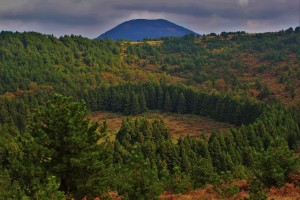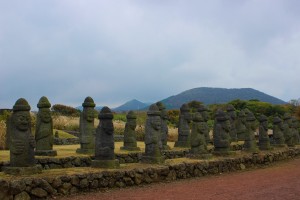1. Communities in the aftermath of human- or natural-disturbances
 In the light of increasing disturbance, both human and natural, the need to understand degradation and appropriate responses is more important than ever. Climate change, resource extraction, war, strife, and migrations all leave significant scars both on people and their landscape. As a result, restoring (or supporting changes in) natural and cultural ecologies will need tobe a priority in coming years. What does knowledge and experience teach us about how to best cope with these disasters, and perhaps better prepare for ones in the future? Abstracts should include topics such as:
In the light of increasing disturbance, both human and natural, the need to understand degradation and appropriate responses is more important than ever. Climate change, resource extraction, war, strife, and migrations all leave significant scars both on people and their landscape. As a result, restoring (or supporting changes in) natural and cultural ecologies will need tobe a priority in coming years. What does knowledge and experience teach us about how to best cope with these disasters, and perhaps better prepare for ones in the future? Abstracts should include topics such as:
- Climate change and its effects on heritage;
- Land reclamation: restoring natural and cultural ecologies;
- Landscape as healing;
- The role of place and place-making in restoration;
- And others.
2. Large landscapes: Are nature and culture indivisible?
 Cultural landscape management may need to confront the same ambivalence which William Cronon addresses in his seminal essay, “The Trouble with Wilderness; or, Getting Back to the Wrong Nature”. Any cultural worldview which perpetuates separation between humans and the natural world is likely to encourage irresponsible environmental behavior. By promoting divisions, we in turn obscure our ties to the ecological systems that we depend on for life, health, and wellbeing. On the other hand, it is no less important to perhaps acknowledge “nonhuman nature”: a world which was not designed by humans and therefore has its own reasons for existing apart from our actions and ties. How do we resolve this dissonance in our thinking, and work toward a better understand of wilderness and large landscapes in our management ideas and practices? Abstracts should include topics such as:
Cultural landscape management may need to confront the same ambivalence which William Cronon addresses in his seminal essay, “The Trouble with Wilderness; or, Getting Back to the Wrong Nature”. Any cultural worldview which perpetuates separation between humans and the natural world is likely to encourage irresponsible environmental behavior. By promoting divisions, we in turn obscure our ties to the ecological systems that we depend on for life, health, and wellbeing. On the other hand, it is no less important to perhaps acknowledge “nonhuman nature”: a world which was not designed by humans and therefore has its own reasons for existing apart from our actions and ties. How do we resolve this dissonance in our thinking, and work toward a better understand of wilderness and large landscapes in our management ideas and practices? Abstracts should include topics such as:
- Natural and cultural sustainability;
- Effects of culture on sustainability;
- Agriculture as a stabilizer or an agent of change?;
- The role of tourism in large landscape conservation;
- The local economy as a conservation tool;
- The effects of other cultural activities on the natural environment;
- The role of nature in cultural adaptation;
- And others.
3. The role of authenticity: When does heritage become a parody of itself?
 Museums, living heritage villages, archaeological sites – these are all dependent on an interaction between the site and the visitor. Interpretation of the layers of heritage, and clarity about what is authentic and what is not guides the visitor’s experience and engagement with history. Settlements, cultural landscapes, and museum sites must engage the cultural and natural heritage of the site tomaintain authenticity about the past, present and future. We invite critical analyses both of positive outcomes, but also heritage gone awry in this discussion of the role and importance of authenticity. Abstracts should include topics such as:
Museums, living heritage villages, archaeological sites – these are all dependent on an interaction between the site and the visitor. Interpretation of the layers of heritage, and clarity about what is authentic and what is not guides the visitor’s experience and engagement with history. Settlements, cultural landscapes, and museum sites must engage the cultural and natural heritage of the site tomaintain authenticity about the past, present and future. We invite critical analyses both of positive outcomes, but also heritage gone awry in this discussion of the role and importance of authenticity. Abstracts should include topics such as:
- Methodologies for documenting heritage;
- The effects of authenticity on visitor experience;
- The role of interpretation in the perception of authenticity;
- Integrity and authenticity;
- Identifying authenticity and integrity in the absence of documentary evidence;
- And others.
4. The role of traditional and indigenous knowledge in heritage and nature conservation
 Communities and their associated lands are created and shaped in novel and significant ways by those who inhabit them. Embedded in local knowledge are the tangible and intangible features that govern a culture’s understanding of the world including relationships to landforms, water, plant and animal species, language, music and customs. Through an accurate representation of traditional and indigenous knowledge, we may gain incredible lessons in planning, adaptation, and survival that translate across cultures. Abstracts should include topics such as:
Communities and their associated lands are created and shaped in novel and significant ways by those who inhabit them. Embedded in local knowledge are the tangible and intangible features that govern a culture’s understanding of the world including relationships to landforms, water, plant and animal species, language, music and customs. Through an accurate representation of traditional and indigenous knowledge, we may gain incredible lessons in planning, adaptation, and survival that translate across cultures. Abstracts should include topics such as:
- Sacred places;
- Folklore and music;
- Traditional gardens;
- Ethnobotany;
- Landscape memory
- And the role of cultural knowledge in adaptation.
